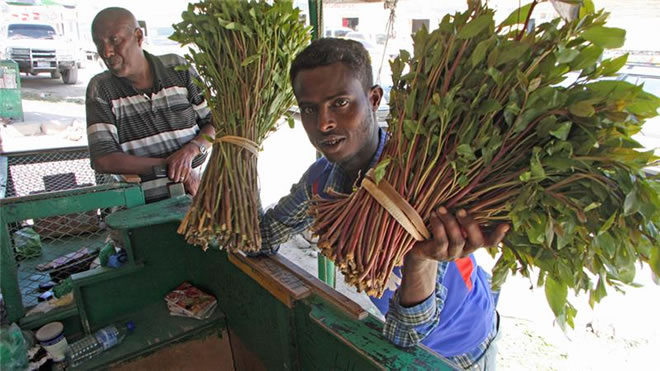
Somaliland spends $300 million dollars a year on qat imported from Ethiopia, while Somalia probably spends twice of that amount on import of qat from Kenya. Photo: James Jeffrey/Al Jazeera
 |
Mohamed Bahal
Monday, June 20, 2016
Qat is scientifically known as Catha Edulis and contains chemicals that stimulate blood circulation causing BP. It also inhibits digestive enzymes and stops appetite. It creates hallucination, fantasy and and uninterrupted talks. Together with all those harmful effects, it also causes family breakdown.
One of the main reasons that convinced the Home Secretary of UK to ban the qat was when she saw how Somali male parents who chew qats abandoned their responsibilities to take care of their families.
Kenya is a country that prosper on the downfall of Somalia. Kenya dared to claim the territorial sea
boundary of our country despite the Law of the Sea of the United Nation. Somalia has no option but to resort to the International Court of Justice. Whether Kenya will accept the outcome of the Court decision is an open question.
There are Somali business people who transformed slum area in Nairobi in to sparkling high rises with booming business. The pay lavish taxes to Kenya Government. In return, the Somalis are being harassed and taken to jails for no justifiable reasons. The building of the wall along the boundary of the two countries and the imminent repatriation of Somali refugees are meant tit for tat of the Sea Boundary dispute.
If Kenya wants to improve the economy of their farmers by producing more Miro to export to Somalia and else where, is there political will by the Somali Government to ban qat import? Can the Government save the people from the catastrophic health damage caused by this harmful drug?
A short glimpse of how much hard currency being spent on both types of qat, makes you wonder
how a country with no exportable commodities able to earn hard currency to import qat.
Somaliland spends 300 million dollars a year on qat imported from Ethiopia, while Somalia probably spends twice of that amount on import of qat from Kenya. This flow of hard currency comes from the Somali Diaspora whose charitable offer turned to be health hazard for qat chewers.
Qat has deep rooted culture among the Somalis where ever they live. Even though qat is on banning list in most Europeans and North American countries, still in a disguised fashion, it arrives at high prices.
I recently watched video showing religious gathering in Nairobi and attended two famous Somali religious scholars who were reciting Hadith about the rewards of Ramadan Karim. One man raised a question and said “ I’m a qat dealer if I want to pay charity in the month of Ramada, can I pay from proceeds of qat sale?” Both Sheikhs replied and said that charity can not be paid from qat sale, because qat is a drug that affects the mind of the person and causes economic and social problems.
We are in a lamentable situation where by both urban and rural dwellers , the majority are addict
to qat. It is sad to hear even animal herders in rural areas chew qat in tea shops set up to make money
from the nomadic population.
In Somaliland there are 3 types of qat with different prices. First quality qat costs $40.00 dollars per kg. second type $20.00 dollars per kg. and third type $4.00 per kg. If heavy taxation is imposed on the qat, people who buy 2nd and 3rd quality qat who happen to be low income people facing income crises, will have no choice but to stop qat chewing. The first quality buyers are people with high income who can afford to buy nutritive foods to off set the effect of qat even though it is doubtful if the chemical effects can be minimized by balanced food.
If current trend of qat importation continue, the future of our people will be in great jeopardy in terms
of health and economy. It is a right time to request WHO to conduct comprehensive report on the
damages inflicted by qat on the health of our people.
Mohamed Bahal
[email protected]